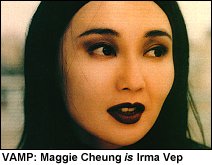![[Deep Focus]](../../flicker/logo.gif) |
|
|
IRMA VEP | |
 |
GRADE: B |
|
As soon as it started making the rounds on the festival circuit, I started getting mixed signals on Irma Vep, the new on-a-shoestring feature from the underdistributed French director Olivier Assayas. My pal Mike couldn't stop raving about it, said I should get on my knees and pray for it to find distribution since I missed the New York premiere. Meanwhile, my pal Pablo reported back to me from the Telluride Film Festival with a conspicuous lack of enthusiasm. Pressed for details, he sort of shrugged (I imagine he shrugged, anyway; this was a telephone conversation) and mumbled something about half the audience sleeping through half the movie. To my eyes, that about sums it up -- Irma Vep is an arguably brilliant film with the noncontradictory potential to bore half its intended audience and enchant the other half. In my case, I was bored and enchanted by turns. I guess you could call me an Assayas fan, since I've managed to see four of the six features he's directed to date. At an Assayas retrospective in New York last year, I saw Cold Water (1994), a chilly and brilliant evocation of troubled youth, and Paris S'Eveille (1991), a less assured but more charming look at young people, the plans they make, and the way things turn out. I also sat through Une Nouvelle Vie (1993) -- a longish soap opera shot in widescreen and starring Jean-Pierre Léaud (he played Antoine Doinel in all those Truffaut movies). Nothing about this low-key film would have suggested to me the rigor, style, and compassion of the other two. Irma Vep is a little like that. Just when I felt like drifting off into Neverland, something vivid and delicious would startle me awake. As a movie about moviemaking, Irma Vep is truly a navel-gazer, but navel-gazing is its text as well as its subtext, so there's no use complaining about it. Even so, the dictum of "show don't tell" could perhaps have been more closely followed, as the film is its liveliest and most convincing when Assayas is allowing performance and character to reveal each other rather than forcing didacticisms into his characters' mouths. Hong Kong superstar Maggie Cheung stars as Hong Kong superstar Maggie Cheung, who can't speak a word of French but has flown to Paris to star in an ill-fated remake of a silent film curio called Les Vampires. (It's almost inconceivable that Cheung would agree to appear in such a low-profile film -- except that the fictional production of Les Vampires is no more obscure than Irma Vep itself! Go figure.) Cheung was cast because the film's aging director, René Vidal (Léaud), was taken by her performance in the outlandish Hong Kong actioner The Heroic Trio. She will be dressed up in a skin-tight rubber suit, and will skulk through the shooting schedule with a crew that's drifting further and further into entropy. And that, more or less, is it. The production does not go well, and Vidal in particular is racked with self-doubt. Costumer Zoe (Nathalie Richard, who is especially fine) has a crush on Cheung of which much will be made by co-workers. The radiant Cheung, who has to communicate with everyone in broken English, can't figure out what the hell Vadim wants from her. The dailies are incomprehensible, and the set is an enclave of bitchiness, sniping, and backstabbing. A beefy film critic shows up to heap praise on Arnold Schwarzenegger and wonders why Cheung hasn't worked with John Woo. Even better is a crusty old director's provincial distaste for "Jack Chan" films, or Vidal's seeming inability to reconcile his affection for the exuberant Heroic Trio with the trappings of "sophisticated" French cinema. Cheung herself will insist, to little avail, that the world of cinema is a better place for its plurality. One assumes that Assayas is off-camera, agreeing with her. It all sounds like great fun, and in retrospect I think it may be more enjoyable to think about the movie than to actually watch it. There's a famous story about movie mogul Harry Cohn declaring proudly that he could tell whether a movie was any good or not by how much his fanny twitched while he was watching it. (Herman J. Mankiewicz's summary response? "Imagine -- the whole world wired to Harry Cohn's ass!") Mine was sliding out of the chair. A handful of sequences stand out -- including the one featuring a startling cameo by Arsinée Khazanjian (Exotica) -- but others are mighty dry, and I have to admit to getting really bored really quickly with Léaud's troubled Old Wave schtick. The culmination of all this, however, is something to behold. In editing his final cut, Vadim turns into Stan Brakhage, and Assayas finds aesthetic truth in disintegration. (I found this twist particularly interesting, since the original Cahiers du Cinema crowd was not at all impressed with Brakhage or his avant garde American cohorts.) The ultimate message of this movie about movies does indeed have to do with the medium itself, and is played out more viscerally and breathtakingly than any other shadowplay you're likely to see this year. Scrapping all that has come before, Assayas seems to be calling for a reinvention of vision, and a new connection with the experimental. Accordingly, his resolution is beautiful and moving, both a forceful expression of near-madness and a tantalizing taste of a purer cinema.
| |
|
Written and directed by Olivier Assayas Cinematography by Eric Gautier Edited by Luc Barnier Starring Maggie Cheung, Nathalie Richard and Jean-Pierre Léaud USA, 1997
You may want to know more about Maggie Cheung. | |

| |
 http://www.deep-focus.com/dfweblog/
bryant@deep-focus.com
http://www.deep-focus.com/dfweblog/
bryant@deep-focus.com